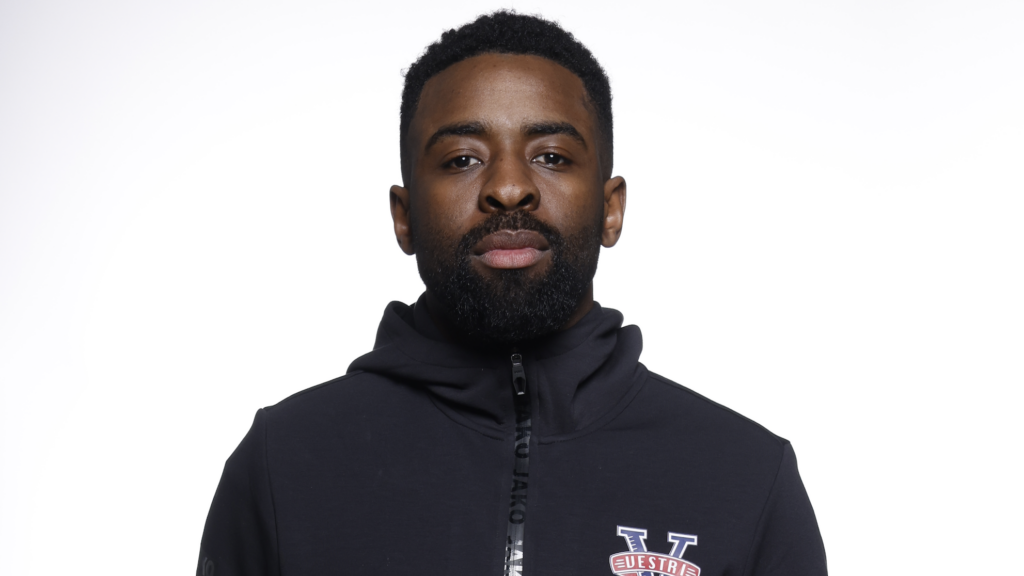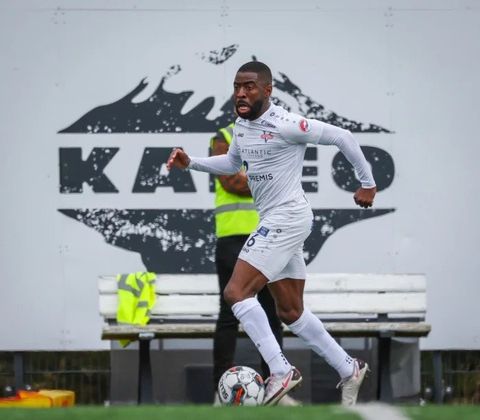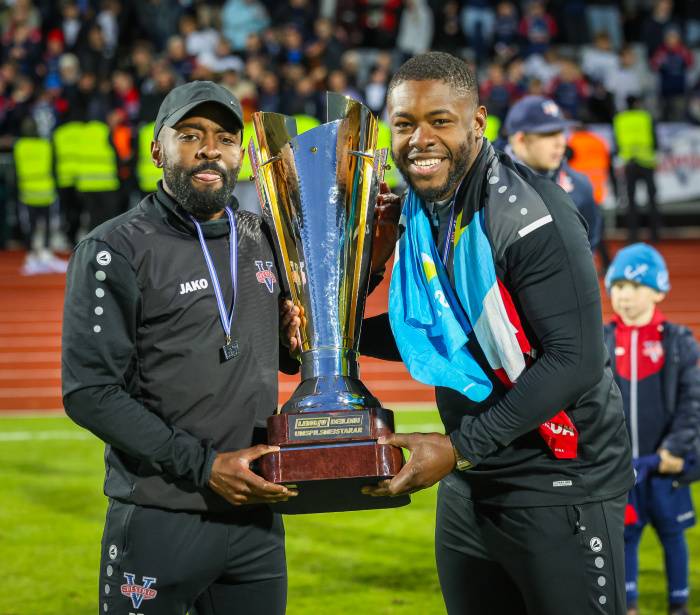
BY ABBIE JENSEN
Daniel Badu shared his journey from defensive midfielder to assistant coach at Íþróttafélagið Vestri (Vestri), spanning from England’s pitches to the frosty landscapes of Iceland. Interwoven with his personal story, he shared thoughtful insights into the broader challenges facing modern football, his own path reflecting some of the sport’s ongoing issues.
Daniel explains that his journey into football began simply with a love for the game, sparked by playing with his brothers when he was younger. He emphasises that his transition into coaching was driven solely by his deep passion for football, and ‘understanding what football can do for a person’s life’. This perspective highlights an often-overlooked truth: for many, football is far more than just a sport – it becomes a core part of their identity, providing purpose and meaning.
This very passion and love for the game ultimately led him abroad. Searching for stability and daily engagement with the sport, an opportunity arose in Iceland through his brother Ryan, an agent. In England, he began his journey through the school football system, balancing games with stints at various non-league clubs before eventually breaking through at Welling United. However, a managerial change, combined with the uncertainties of university life, shifted his trajectory. It was around this time that the opportunity in Iceland arose. After a trial, navigating volcanic eruptions, and completing a season abroad, Daniel returned to England. But when another opportunity in Iceland presented itself, he decided to take it, thinking, “Why not?”

Daniel’s journey through coaching badges – both in England and Iceland – is a tale of two systems. In Iceland, the road is paved with encouragement and flexibility. In England, it’s a maze of obstacles, designed to weed out rather than nurture.
In England, he observes that obtaining coaching badges is more challenging, feeling as though “they don’t want every coach to pass.” While this can be frustrating, he acknowledges its positives, as the coaches who do qualify are often of a higher standard. In Iceland, however, the approach feels more inclusive, with a sense that the system is designed to help coaches succeed and progress.
From midfielder to teacher, Daniel has also embraced mentorship as an essential part of his coaching journey, becoming “more conscious of it now.” He shared an example of a young player with a great attitude who was informally coaching younger kids. Recognising the player’s potential, Daniel encouraged him to pursue coaching seriously and offered guidance. For Daniel, he highlights the importance of starting early: “The earlier you go in, the better for you.” Though older coaches have traditionally been favoured and continue to make their mark, this dynamic is gradually shifting. Coaches in the Premier League like Fabian Hürzeler, Ruben Amorim, Kieran McKenna, and Russell Martin, all in their early to late 30s and at an age they could still be playing the game, serve as strong examples of this emerging trend where former players are transitioning into coaching at a younger age. Bringing fresh ideas, having stronger connections with players, and the potential for growth in the role- are qualities that make them increasingly appealing to clubs looking to invest in long-term coaching success.

Our discussion then moved to the challenges faced by English coaches, especially their underrepresentation at top-tier clubs. Daniel points out that English coaches rarely land roles at top clubs capable of winning the Premier League, which limits their opportunities at the highest level. He references Frank Lampard’s successful first tenure at Chelsea, but in general he asserts that there is a cultural issue, in how football is analysed and understood in England the focus tends to be on individuals- whether players or coaches – rather than on the broader systems, strategies, or collective effort that influence outcomes. He argues that this reflects a philosophical tendency in English football (and perhaps society) to attribute success or failure to specific people, rather than examining the deeper, interconnected factors at play.
Thomas Tuchel’s appointment as England manager sparked a lot of discussion about the candidates, particularly why no English coaches were chosen. Currently, only 15% of Premier League clubs are managed by English coaches. The pool of potential candidates isn’t exactly strong, especially considering the English coaches managing clubs like Newcastle, Wolverhampton, and Everton – teams that aren’t competing for titles or making extraordinary strides in success. This raises the question: why is there such a lack of English coaches at the top? While the player talent pool in England continues to grow, this hasn’t been mirrored in coaching. One reason is that many of today’s English coaches come from an older era of football, where the focus was more on direct, long-ball tactics. However, times have changed, and football is now more technical and tactical. As the game evolves, we’ll likely see more English coaches, a new generation emerging with a different approach. Other reasons, of course, include the fact that FA courses are expensive and, interestingly, quite difficult to get onto and pass, which Daniel notes contributes to this problem.
Additionally, we spoke about the stereotype that English coaches are less tactical, but Daniel offers a more nuanced perspective. While he acknowledges that this might be true “in general,” he also points out an exception from his own experience: “One of the best coaches I had was on a coaching course. He was an English coach and tactically fantastic, but perhaps unlucky not to break through as a top-level coach.” Reflecting further, Daniel suggests that the issue might not be a lack of tactical ability among English coaches but rather a lack of opportunities for the most tactical ones to succeed. Drawing from his own experience of coaching courses in England 15 years ago, Daniel observed that the process was “more structured and rigid,” with specific expectations for sessions. In contrast, Icelandic coaching feels more flexible. While Icelandic football isn’t the most tactical even at its highest levels, Daniel notes there are still tactical coaches within the system. However, he humbly admits, “I’m not the most tactical coach myself.”
Daniel’s experience as a Black person in Iceland was different, shaped by curiosity rather than challenge, as many locals simply hadn’t encountered someone like him before.
This sparked a conversation on the lack of representation of Black coaches in European football, which is concerning, especially considering the high percentage of players from African and Caribbean heritage in the game. For instance, 43% of the Premier League consists of players from African or Caribbean backgrounds. Daniel remarked, “It’s a shame that there aren’t [a lot of black coaches in football], if you look at the percentage of African players or African descent players, or Asian”. The underrepresentation of Black coaches in top flight football goes beyond England, as there is only 1 Black coach in the Bundesliga, 2 in Ligue 1, and none in La Liga. Daniel believes this will change over time, drawing a historical parallel to the resistance English football once had to sign Black players. He suggests that progress for Black coaches will require visible examples of success – coaches from these communities excelling in top roles to challenge stereotypes and shift perceptions. As more Black coaches become qualified and given opportunities, the industry is expected to mirror the transformation that has occurred with players, leading to greater representation and inclusion.
Additionally, we explored why diversity in coaching is essential, especially when it comes to understanding a player’s context. Daniel highlights this, saying, “It would be harder for me to understand some behaviors perhaps or how to get the best out of some women simply because I’ve not done it much and I don’t have any experiences of coaching women.” He notes that when a coach cannot relate to a player’s background, barriers to effective communication and connection can arise. “Understanding their context is of course going to help.” This insight demonstrates the importance of bridging gaps to improve coaching effectiveness and nurture talent across all backgrounds.
But, this need for contextual understanding extends beyond racial considerations. Alex Clapham says that in Spain, coaching courses begin with a focus on teaching coaches how to work with people, incorporating subjects like sociology, psychology, and pedagogy, while in England, the emphasis is more on football-specific elements such as tactics, psychology, and physical training from the start. However, it may be more important for coaches to be trained in the humanistic side of coaching, going beyond just the practical and tactical aspects of football. Clapham also pointed out that the best coaches, like Thomas Tuchel and Jurgen Klopp, often come from countries where this broader, people-focused approach is emphasised, or they hold higher qualifications in areas related to understanding and working with individuals, like Graham Potter with his masters in emotional intelligence.
Daniel shared that his goal is to coach “at the highest level possible,” with a clear ambition to one day coach the Ghana national team. Daniel is interested in coaching players that want to ‘learn and get better’, as well as aspirations for himself to ‘become as good a coach as I can be’.
However, Daniel acknowledges the challenges Ghana faces in achieving success on the international stage, and this was a key point of discussion. He highlights player selection is a significant issue, emphasising that it impacts both the nation’s performance and the success of its coaches. He feels that picking the best players should be paramount, yet selections are sometimes swayed by big reputations or players who were “good in the past.” This long-standing issue of player selection, Daniel argues, continues to hamper Ghana’s potential on the global stage.
Another challenge Daniel touches on is player allegiance. Many talented footballers with dual heritage can choose what country to represent. Players like Eddie Nketiah and Callum Hudson-Odoi, for instance, were eligible for Ghana but opted to play for England. Daniel acknowledges that he “can’t be critical” of an individual’s choice, recalling that as a young boy watching the World Cup, his own dream was to play for England – Ghana wasn’t even on his radar then. However, as he grew older, learned more, got into coaching, and connected deeply with his heritage, his perspective shifted. Today, Daniel feels a strong connection with Ghana and is adamant: “I’d want to coach them 100%.”

Beyond player allegiance, Daniel raises concerns about how nations like Ghana present themselves to potential players. He questions whether the Ghana Football Association is doing enough to inspire pride and motivation in players to represent the country. Furthermore, external factors that can influence a player’s decision. Daniel pointed out that many European clubs discourage their players from participating in AFCON due to its timing in the middle of the season.
Additionally, infrastructure and organisation can be significant hurdles. For example, facilities in some African nations may not match the standards players experience in European countries. Earlier this year, during the World Cup 2026 qualifiers, 17 of the 43 teams in Africa scheduled to host a home game in June and July were not permitted to do so because their stadiums did not meet the required standards. Unfortunately, this disparity extends to aspects like treatment, pay, and overall professionalism, we always end up seeing these situations on news headlines, which can lure players toward representing European nations instead.
From a coaching perspective, Daniel believes that the best Ghana teams were those with a clear “identity.” He highlighted their tactical strength, with defensive solidity being a big part of their success. I often think back to the 2010 Ghana national team, which stands out as a fantastic example, reaching the quarterfinals of the World Cup – a historic achievement. Many praise that team for its blend of generations and defensively solid setup, especially considering they progressed as far as they did without their talisman, Michael Essien. Notably, Ghana remains one of only three African nations to have reached the quarterfinals of a World Cup, with no African team yet advancing to the semifinals. The footballing world needs African nations to reach greater success in international tournaments. Achieving this would not only elevate the continent’s status in global football but also inspire future generations of players, coaches, and fans, proving that African teams can compete at the very highest level.
Daniel Badu’s journey in football, spanning countries, roles, and challenges, offers a unique perspective on the complexities of playing and coaching. His story highlights not only the challenges of qualifications and badges, but also the deeply human side of leadership and mentorship. Iceland, though far from easy to adapt to, has proven to be a fulfilling place for Daniel, who has spent the last 14 years balancing personal life and coaching. He’s found stability and joy in doing what he loves. Yet, when asked about returning to England to coach, Daniel’s answer is clear – his love for football is boundless, and wherever it leads, he will follow. Coaching his homeland, Ghana, is something he would love to do one day, though it’s just one of many aspirations in his career.
However, despite his personal success, lingering issues persist in the world of football, such as the differences in coaching systems across Europe, the lack of successful English coaches, the underrepresentation of Black coaches, and the unique challenges facing African nations. As football continues to evolve, the real challenge is not just about who wins or loses on the pitch – it’s about breaking free from old patterns and embracing the transformative potential of the game. Will the next generation of coaches, players, and leaders push past the barriers that have held the sport back, or will we fall into familiar cycles? For Daniel, the aim isn’t just to develop as a coach but to contribute to the development of the game in all its aspects.